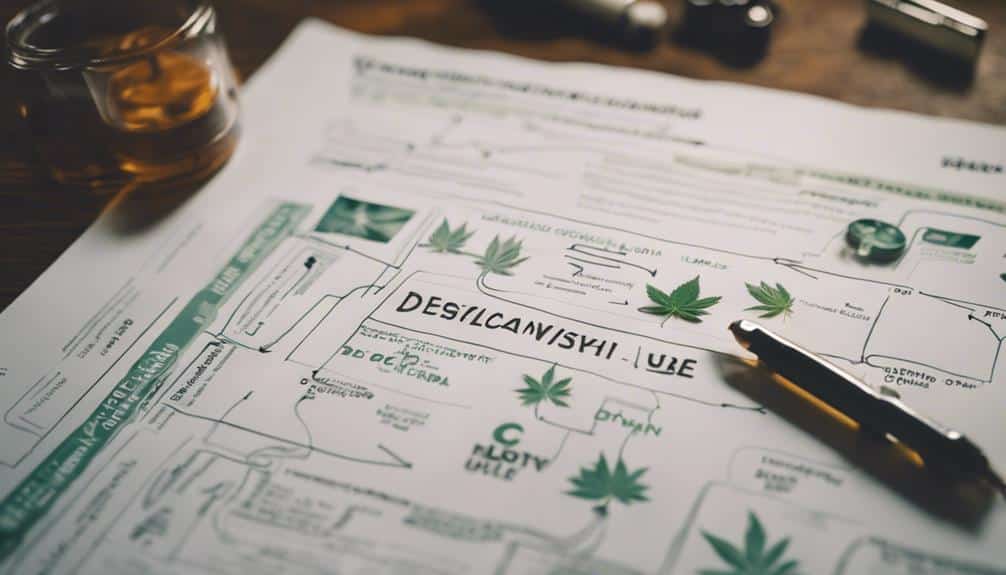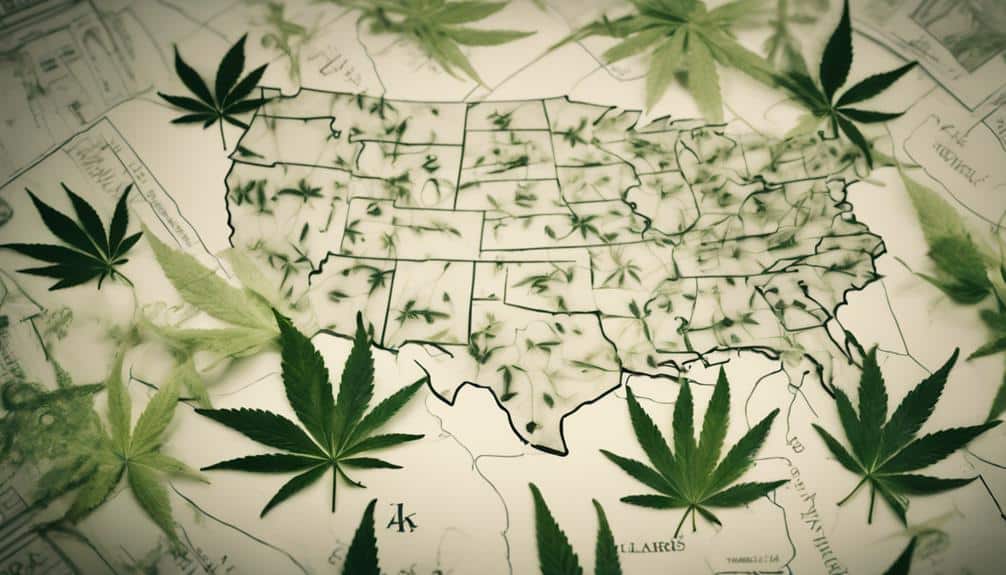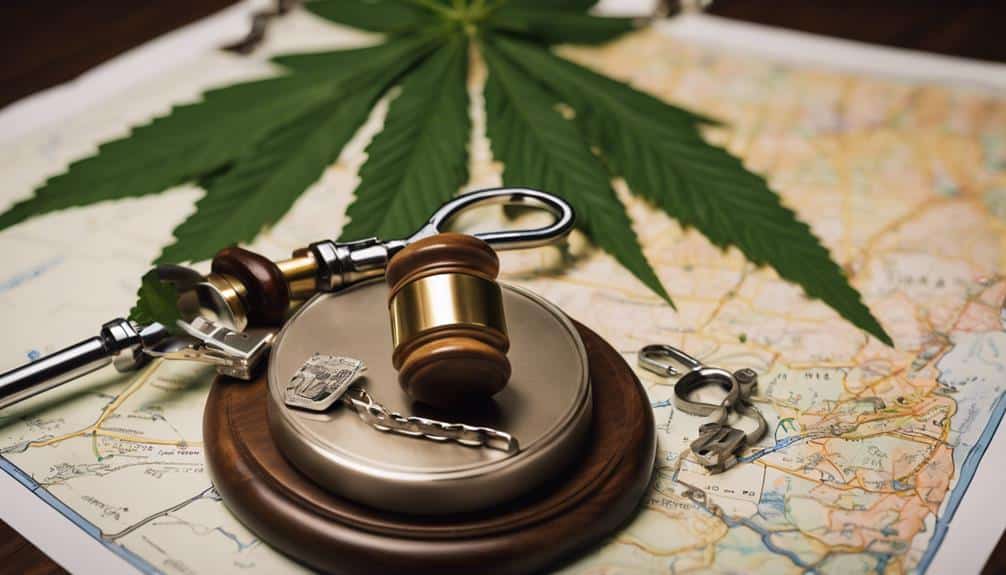You may not be aware that Delaware’s medical cannabis laws, enacted in 2011, have significantly evolved over the past decade. Staying current with these changes is crucial, especially as both patients and caregivers navigate the complexities of the state’s medical marijuana program. Understanding the application process, recognizing qualifying conditions, and comprehending legal limitations can be a daunting task. There’s more to uncover about how these laws impact your access to treatment and how non-compliance could potentially lead to serious legal consequences. So, how well-versed are you in the legal aspects of medical cannabis use in Delaware?
Table of Contents
Delaware’s Medical Cannabis Laws

To understand Delaware’s medical cannabis laws, it’s crucial first to note that using medical marijuana is legal for patients who’ve obtained a valid medical marijuana card from a licensed physician. Herein lies the concept of Cannabis Taxation. Unlike other states, Delaware hasn’t imposed a special sales tax on medical marijuana. Instead, the standard state sales tax of 0% applies. This measure ensures affordability by emphasizing its role as a treatment rather than a business commodity.
Next up is patient privacy. Delaware law provides robust protections for patient privacy by maintaining a confidential list of all patients and caregivers issued with medical marijuana registry identification cards. Importantly, this information remains private and isn’t subject to public records requests.
As a service provider understanding these laws is essential because you’re not just selling a product; you’re offering a lifeline to patients in need. Being informed about these legal aspects helps ensure that you’re serving your clients in the best possible manner.
Qualifying Health Conditions
So, you’ve got your Delaware medical cannabis card, but what conditions qualify for its use? The state of Delaware has a specific list of qualifying conditions eligible for medical cannabis use. These conditions have been identified due to the efficacy of cannabis strains in treating associated symptoms.
- Chronic Pain: Medical cannabis has proven effective in treating chronic pain conditions, including severe, persistent pain that traditional methods can’t effectively treat.
- Cancer: Patients undergoing cancer treatment often experience severe side effects. Medical cannabis can help manage these, thereby improving quality of life.
- Post-Traumatic Stress Disorder (PTSD): Research shows that medical cannabis can help manage PTSD symptoms, providing much-needed relief.
The above are just a few examples; the list is much more extensive. It’s crucial to have a thorough understanding of medical cannabis to comprehend its potential benefits and risks for various health conditions. Always consult with a healthcare provider to determine if medical cannabis is the right treatment for your condition. Remember, your health is the ultimate priority and informed decisions often lead to better outcomes.
The Application Process

Having understood the qualifying health conditions, let’s now unpack the steps you need to follow to apply for a medical cannabis card in Delaware. It’s a process that requires not only your commitment but also a thorough understanding of the rules and regulations surrounding cannabis cultivation and use.
First, you need to visit a licensed physician who will certify that you suffer from one of the qualifying medical conditions. After receiving this certification, you’ll need to complete an application form provided by the Delaware Department of Health and Social Services (DHSS). This form requires your basic information, medical details, and written confirmation from your doctor.
Next, you’ll be expected to educate yourself about the laws and regulations surrounding cannabis use in Delaware. Part of patient education involves understanding the limitations and possibilities of medical cannabis use. You’ll also need to pay an application fee which currently stands at $125.
Lastly, remember that obtaining a medical cannabis card doesn’t give you the right to cultivate cannabis at home. Delaware’s laws are stringent; any form of home cannabis cultivation is illegal. However, with your card, you can legally purchase medical cannabis from state-licensed dispensaries.
Patient Rights and Responsibilities
Once you’ve secured your medical cannabis card, it’s crucial to understand your rights and responsibilities as a patient in Delaware. The state has carefully designed regulations balancing patient access to medical cannabis with respect for medical ethics and privacy protection.
- Privacy Protection: Delaware law safeguards your health information ensuring it isn’t disclosed without your consent. The Department of Health and Social Services manages registration data with utmost confidentiality.
- Medical Ethics: You’re entitled to receive clear, honest, comprehensive information about your condition and treatment options involving medical cannabis. It’s then up to you how wisely this information is used; adhering to prescribed dosages and reporting any adverse effects immediately.
- Compliance with Laws: You must follow the state’s rules on cannabis use. This includes not driving under the influence and refraining from sharing your medication with others. Violating these laws can result in penalties, including losing your cannabis card.
In essence, your rights as a patient are matched by responsibilities. By understanding and respecting these, you can ensure safe, effective, and ethical use of medical cannabis. As you continue your journey, stay informed about these rights and responsibilities to better serve your health.
Caregiver Regulations in Delaware

In Delaware, caregiver regulations play a vital role in facilitating the use of medical cannabis for patients who might not be capable of administering their own medication. The state recognizes the importance of caregiver training to ensure patient safety and proper administration of medication.
Becoming a caregiver isn’t straightforward; it requires a deep understanding of the patient-caregiver relationship which is not just about providing physical assistance but also understanding the patient’s needs and preferences. Delaware’s caregiver regulations specify that caregivers must be at least 21 years old with no felony convictions and be a close relative or friend committed to the patient’s wellbeing.
Moreover, caregivers must undergo training to understand correct dosage methods of administration and potential side effects of medical cannabis. Comprehensive caregiver training equips you with necessary knowledge to administer medical cannabis and prepares you to deal with possible emergencies.
Medical Cannabis Dispensaries
While caregivers serve a crucial role, it’s also essential to understand the workings of medical cannabis dispensaries in Delaware. These dispensaries, regulated by stringent laws, follow specific protocols ensuring product quality and patient safety.
Here are three key aspects you need to know:
- Dispensary Licensing: Applying for a dispensary license in Delaware is a rigorous process. The state scrutinizes business plans, security measures, and operational procedures before issuing a license. This ensures only competent entities handle medical cannabis.
- Product Quality: Dispensaries are obligated to sell only high-quality medical cannabis. Products undergo thorough testing for potency and contaminants providing an assurance of safety and effectiveness to patients.
- Patient Service: Dispensaries are more than just retail outlets; they’re service centers for patients. They provide education, answer queries, and guide patients on the appropriate use of medical cannabis.
Understanding these aspects empowers you to better serve those relying on medical cannabis for their healthcare needs. By appreciating the role of dispensaries and the robust regulatory framework they operate within, you can contribute towards a more compassionate and effective medicinal cannabis system in Delaware.
Understanding Legal Limitations

Navigating the legal landscape of medical cannabis in Delaware can be complex, so it’s essential to be aware of the limitations and restrictions in place. Delaware law restricts cannabis cultivation to licensed dispensaries only, making personal cultivation illegal. This means you can’t grow your own medical cannabis at home, regardless of a valid medical marijuana card.
Unlicensed cannabis cultivation carries serious legal consequences. In particular, unlicensed cultivation can result in fines, potential jail time, and revocation of your medical marijuana card. It’s critical to remember that despite medical cannabis being legal at the state level, federal law still considers any cultivation illegal creating a dichotomy that can cause confusion.
Furthermore, there are limitations on the amount of medical cannabis you can possess. Currently, Delaware law allows you to carry up to six ounces of medical cannabis. Possession beyond this limit is considered illegal and could lead to legal consequences.
Understanding these legal limitations is vital for anyone involved with medical cannabis in Delaware whether you’re a patient caregiver or a medical professional. Keep yourself informed to protect your rights and stay within the boundaries of the law.
Consequences of Non-Compliance
Ignoring Delaware’s medical cannabis laws can land you in trouble with consequences ranging from fines to incarceration. Non-compliance isn’t just a minor hiccup; it’s a grievous error that could potentially derail your life.
It’s crucial to understand the legal repercussions you might face for non-adherence. Here are three non-compliance penalties you should be aware of:
- Fines: Authorities can impose monetary fines as a punitive measure. The amount varies but it’s always significant.
- Incarceration: In severe cases incarceration becomes reality with sentence length depending on violation severity.
- Revocation of Medical Cannabis Card: If you’re a registered medical cannabis user, non-compliance could lead to the revocation of your card. This penalty means no legal access to the medicine you need.
Future of Medical Cannabis in Delaware

Looking ahead, the future of medical cannabis in Delaware is poised for significant growth and development due to ongoing legislative changes and an increasingly accepting public perception. The state seems to be on the right path, but as you navigate this promising landscape, understanding potential implications of cannabis taxation and research advancements is crucial.
Cannabis taxation will likely play a critical role in shaping the industry’s future. It’s a promising source of revenue for the state providing funds that could be reinvested into healthcare and education. However, it’s crucial to strike a balance as over-taxation could burden dispensaries and patients potentially driving them towards an unregulated market.
In terms of research advancements they’re vital in ensuring medical efficacy of cannabis. Increased investment can lead to discovery of new applications improving patient care. It’s a step forward in eradicating stigma and establishing cannabis as a legitimate therapeutic alternative.
Conclusion
In Delaware, 67% of patients reported improved health outcomes with medical cannabis use. However, navigating legalities can be challenging. Understanding qualifying conditions application process rights responsibilities caregiver regulations dispensary laws is crucial while also being aware about legal limitations and non-compliance consequences. The future of medical cannabis in Delaware looks promising but staying informed and compliant is key to safely benefit from this treatment.
We invite you to visit us at Cannabis Docs of Delaware to learn more about the legal aspects of medical cannabis use. Our team is always ready to help clear any doubts you might have. We understand the complexities involved and we’re eager to guide you through the process ensuring safe and legal benefit from medical cannabis.
Feel free to give us a call at (855) 420-6797 anytime. We’re looking forward to hearing from you!

